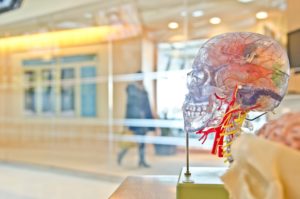by Robert Rue—
Calhoun School Graduation, June 11, 2021, Icahn Stadium
Trustees, administration, faculty, staff, friends, grandparents, parents, and most importantly—Class of 2021:
I’d be honored to speak at any Calhoun graduation—this is where I teach, and it’s my alma mater—but I feel especially touched to be asked to do this in front of this class that includes my 8 senior advisees. Outside of my family, your class, for years now, has provided my best reasons for waking up in the morning, studying the world with some reserve of optimism and for, on non-lockdown days, getting out the front door.
Class of ’21, whatever small thing might be valuable in this speech, I offer it to you:
On January 15, 1992, British astronomer Andrew Lyne prepared to take the podium at a gathering of the American Astronomical Society in Atlanta. The fellow scientists who packed the venue had come to hear Lyne talk about perhaps the most exciting discovery of the latter half of the 20th century—the existence of a planet outside the solar system. Such a planet had been deemed impossible before Lyne published his research in the scientific journal Nature just a few months before, and now his colleagues from around the world grew quiet as Lyne took the stage.
The thing was, Lyne was wrong about the planet. He had come to the false conclusion honestly, but the mistake he had made was so elementary that even the mere English teacher standing before you now understands—thanks to my 1984-85 physics class with John Roeder—at least the concept he failed to account for in his calculations: the Earth’s elliptical, not circular, motion around the sun.
Having checked his math and discovered the mistake on his own, what did Lyne do at the microphone in front of the capacity crowd? With “unbounded embarrassment,” he admitted his mistake.
The question I’ve ruminated about most is what allowed Lyne to see that he was wrong. I’m not talking about the calculation. I’m talking about what he—what any of us—has to overcome to see our wrongness when we are convinced of our rightness.
Human beings have an incredible capacity not only for being wrong but for doubling and tripling down on that wrongness. In fact, our brains did not evolve for hyper-accurate truth-detecting.
What did our brains evolve for? The survival of our genes. Human brains are governed in part by necessary heuristics, self-protective impulses, the desire for status and the tendency to justify rather than question intuitions. For much of human history, the goal of passing on one’s genes was better served by believing in very loosely accurate myths than by a Sherlock Holmesian dedication to reality. Simply put, it was better to bond powerfully with your tribe than it was to stick your hand in the air and express your nerdy, nuanced description of the bad guys from the other side of the river.
But I think the clock has run out on the evolutionary effectiveness of this human strategy. As Israeli scholar Yuval Noah Harari has pointed out, the ability to cause globe-wide harm is relatively new. But technology has now created a deeply connected world in which one person’s mistake anywhere can become a disaster everywhere.
There is no alternative: we have got to think better than our ancestors.
We—you, almost-Calhoun graduates—need to accept what might be the most consequential challenge I can imagine: to stop at least this one trajectory of evolution and to set a new course. Your children—if you choose to, and are lucky enough, to have them—and my Alex and Ellie watching this at home will depend on it. My last frightening statement of this speech is this: I don’t think we’ve yet stepped on the evolutionary brake pedal.
The good news is, evolution has given us one, and in my view, an education ought to be measured by whether it is, or is not, teaching us to use it: It’s the ability to self-reflect, to interrogate before indulging our presumptions, to think, to examine and to change our minds.
I find hope in astronomer Andrew Lyne. Imagine the identity he might have constructed for himself and that he therefore would have needed to negate in order to check his math: the already-published, already-legendary astronomer. And yet somehow, that guy decided to sit down and run the numbers again when the only new thing he could have found was the thing he least wanted to see: his own colossal mistake.
I can’t know for sure why Lyne was able to do this, but I don’t think it was because he was a scientist. Scientists are capable of all the human flaws: bias, racism, overconfidence, deceit, and even the inability to add and subtract. But the scientific method—to which Lyne was certainly dedicated, the mindset of never being too sure—is not capable of these flaws. As biologist Heather Heying has said, we should not “trust the science”; we should instead trust science—that is, its way of thinking. Real scientists always know that the science can, and sometimes will, be wrong.
I am increasingly convinced that this way of thinking is what we need more of everywhere—in our friendships, in our families, in our social justice and most essentially, in our schools. And the prerequisite for this ethic of thinking and thinking again is an immensely unpopular state of mind: uncertainty.
If you’re unconvinced of the need for this humility, think of it this way: in 1982, the American architect and inventor Buckminster Fuller estimated that human knowledge doubled every 12 years. Some people claim that the doubling-rate in 2021 is every 12 months. If ever there was a thing to justify uncertainty…
And in this state of semi-conscious worry over my ignorance, it is tempting for me, for us, to reach for narrative, as our ancestors always have—sweeping thematic ideas about the world into which we can stuff some facts. Warring political parties, news networks and social media algorithms are happy to help us out. Simplistic narrative is the ultimate recipe for that most satisfying psychological comfort food: certainty.
Which brings me back to the astronomer standing at the podium having declared his embarrassing error. How did his audience respond to his stunning announcement?
Like scientists. Like educators. Like people who knew that they were—none of them—truth-knowers.
They gave him a standing ovation.
Seniors—I can call you that this one last time—take it from me, someone who knows he knows so little:
Be respectful of how hard it is to be right. Bring a little Andrew Lyne with you to college and keep him with you for the whole journey of life. Even as you take the stances you must take, leave a little room for the possibility of being wrong. Instead of building an identity on assertions you believe to be true, build an identity on being a learner, as you so often did in your Calhoun careers. And if a learner is who you are, then even being wrong—perhaps especially that—is self-affirming.







